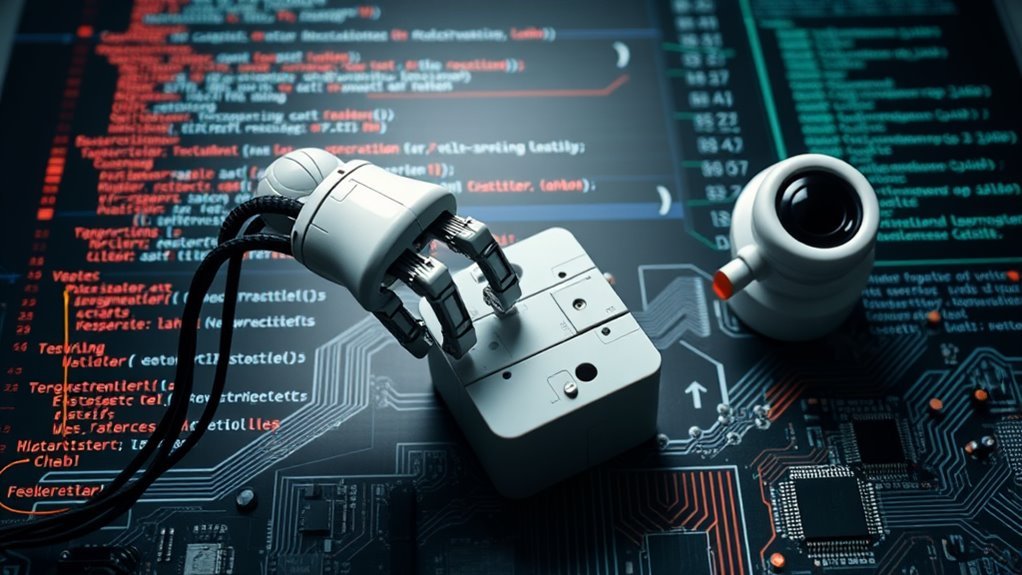You're using AI agents in dynamic environments where they need to learn and adapt quickly. Reinforcement learning is key to achieving this, as it allows agents to learn via trial and error. You'll see agents refine their approaches through feedback mechanisms, and continuous learning will improve their performance. With reinforcement learning, you can improve decision-making in applications like self-driving cars. As you investigate further, you'll uncover how reinforcement learning can release even more capabilities for your AI agents.
Need-to-Knows
- AI agents need reinforcement learning to adapt to environments.
- Reinforcement learning enables trial and error learning.
- Agents maximize rewards through reinforcement learning.
- It allows for continuous learning and improvement.
- Reinforcement learning guides agent decision-making processes.
Reinforcement Learning Basics
You're diving into the world of reinforcement learning, and it's essential to understand the basics. Reinforcement learning allows agents to learn ideal behaviors through trial and error by receiving feedback in the form of rewards or penalties based on their actions. The reward function is central to this process, guiding agent behavior by providing positive reinforcement for desirable actions and discouragement for negative ones, similar to training.
As you investigate reinforcement learning, you'll find that agents learn through continuous learning, adapting their strategies in real-time based on ongoing interactions. This process involves various algorithms, including Q-learning and SARSA, which help agents enhance their actions.
Through trial and error, agents receive feedback that helps them refine their behaviors, ultimately leading to ideal outcomes. Reinforcement learning's ability to facilitate continuous learning and adaptation makes it a powerful tool for training agents to achieve complex goals.
AI Agent Decision Making
The decision-making process of AI agents is a complex one, driven by reinforcement learning's ability to maximize rewards through trial and error. You'll find that reinforcement learning allows AI agents to adapt their decision-making processes based on feedback from their actions in dynamic environments. This process is vital for applications like self-driving cars and robotics, where agents must make ideal decisions in previously unseen situations.
| Reinforcement Learning Aspect | AI Agent Benefit |
|---|---|
| Continuous learning | Improved performance over time |
| Deep Q-Networks | Improved capability to handle complex environments |
| Policy implementations | Adaptation to ongoing interactions and updates |
As you investigate AI agent decision-making, you'll see that reinforcement learning promotes continuous learning, allowing agents to improve their performance by adapting their strategies based on feedback and updates to their policy implementations. This permits AI agents to make effective decisions in complex environments, making them more reliable and efficient.
Learning and Adaptation

As AI agents make decisions, they're constantly refining their approaches through reinforcement learning. You'll find that this process allows AI agents to learn and adapt in dynamic environments. The training process involves feedback mechanisms that guide agent behavior, permitting continuous learning and improvement.
Through reinforcement learning, you can develop AI agents that generalize knowledge across different tasks, enhancing their adaptability in varying situations.
You'll see that reinforcement learning facilitates investigation strategies, allowing AI agents to uncover and adapt to complex problems. The model training process is iterative, encouraging agents to investigate diverse strategies and nurturing organic revelation.
By leveraging reinforcement learning, you can improve the efficiency of model training, leading to better performance in complex environments. This approach allows AI agents to learn and adapt effectively, making them more efficient in solving complex problems.
Reinforcement learning is crucial for AI agents, as it allows learning and adaptation, permitting them to operate effectively in dynamic environments.
Trial and Error Process
During the reinforcement learning process, agents engage in a trial and error process, where they learn to maximize rewards by examining different actions and receiving feedback based on their performance.
You'll notice that AI agents use this trial and error process to refine their strategies over time, permitting continuous improvement. The feedback loop established in reinforcement learning permits agents to adapt their behavior based on the rewards received after each action.
As you investigate reinforcement learning, consider the following key aspects:
- Experimentation: AI agents try different actions to learn about their environment.
- Feedback loop: Agents receive feedback based on their performance, helping them refine their strategies.
- Optimal actions: Through trial and error, agents identify the best actions to take in a given situation.
- Continuous improvement: Reinforcement learning allows AI agents to improve their performance over time, allowing them to operate effectively in dynamic environments.
This process is essential for AI agents to learn complex tasks without requiring explicit programming for every possible scenario.
Autonomous Agent Systems

Many autonomous agent systems utilize reinforcement learning to empower agents to make decisions in dynamic environments through trial and error, maximizing their long-term rewards based on feedback from their actions. You'll find that agents are trained using reinforcement learning, which allows them to optimize complex tasks.
| Application | Description | Outcome |
|---|---|---|
| Self-driving cars | Trajectory planning | Improved safety |
| Robotics | Object grasping | 96% success rate |
| Industry automation | Adaptive strategy | 40% energy cost reduction |
| Healthcare | Dynamic treatment regimes | Improved health outcomes |
| Finance | Portfolio management | Optimized returns |
As you investigate autonomous agent systems, you'll see that deep reinforcement learning plays a key role in their learning process. The applications of reinforcement learning are vast, and you can apply them to various fields, including self-driving cars and robotics, to achieve significant advancements in efficiency and safety.
Dynamic Environment Navigation
You'll traverse dynamic environments more effectively by leveraging reinforcement learning, which allows AI agents to learn ideal actions through trial and error. This approach allows agents to maximize rewards based on feedback from their actions, making it suitable for tasks like autonomous driving and robotics.
To achieve optimal actions in dynamic environments, consider the following:
- Balancing exploration and exploitation is essential for maneuvering dynamic environments.
- Q-learning and Deep Q-Networks can handle high-dimensional state spaces, making them suitable for complex environments.
- Reward functions guide the agent's behavior, adapting continuously to changes in the environment.
- Operational efficiency is greatly improved by reinforcement learning, allowing agents to generalize across similar tasks and adapt to varying conditions.
Most-Asked Questions FAQ
What Is the Role of Reinforcement Learning in AI?
You utilize reinforcement learning to optimize agent behavior via reward signals, exploration strategies, and policy optimization, enhancing environment interaction, decision making, and training efficiency.
What Is the Goal of the Agent in Reinforcement Learning?
You optimize agent objectives by leveraging reward signals, balancing exploration strategies, and refining value estimation to achieve policy optimization, ensuring efficient task completion through environment interaction and knowledgeable choice making.
Does Openai Use Reinforcement Learning?
You see OpenAI using reinforcement learning in models, optimizing training methodologies for better AI performance, and integrating human feedback for more efficient applications.
Does Generative AI Use Reinforcement Learning?
You'll find generative models often use reinforcement learning to improve training efficiency, leveraging reward systems for policy optimization, and exploration strategies to enrich model evaluation and AI creativity.
Conclusion
You'll find that reinforcement learning is essential for AI agents as it allows them to make decisions, learn, and adapt in dynamic environments. Through trial and error, they navigate and respond to changing situations, making them more autonomous and effective in various systems. You'll see this in action as they improve over time.
